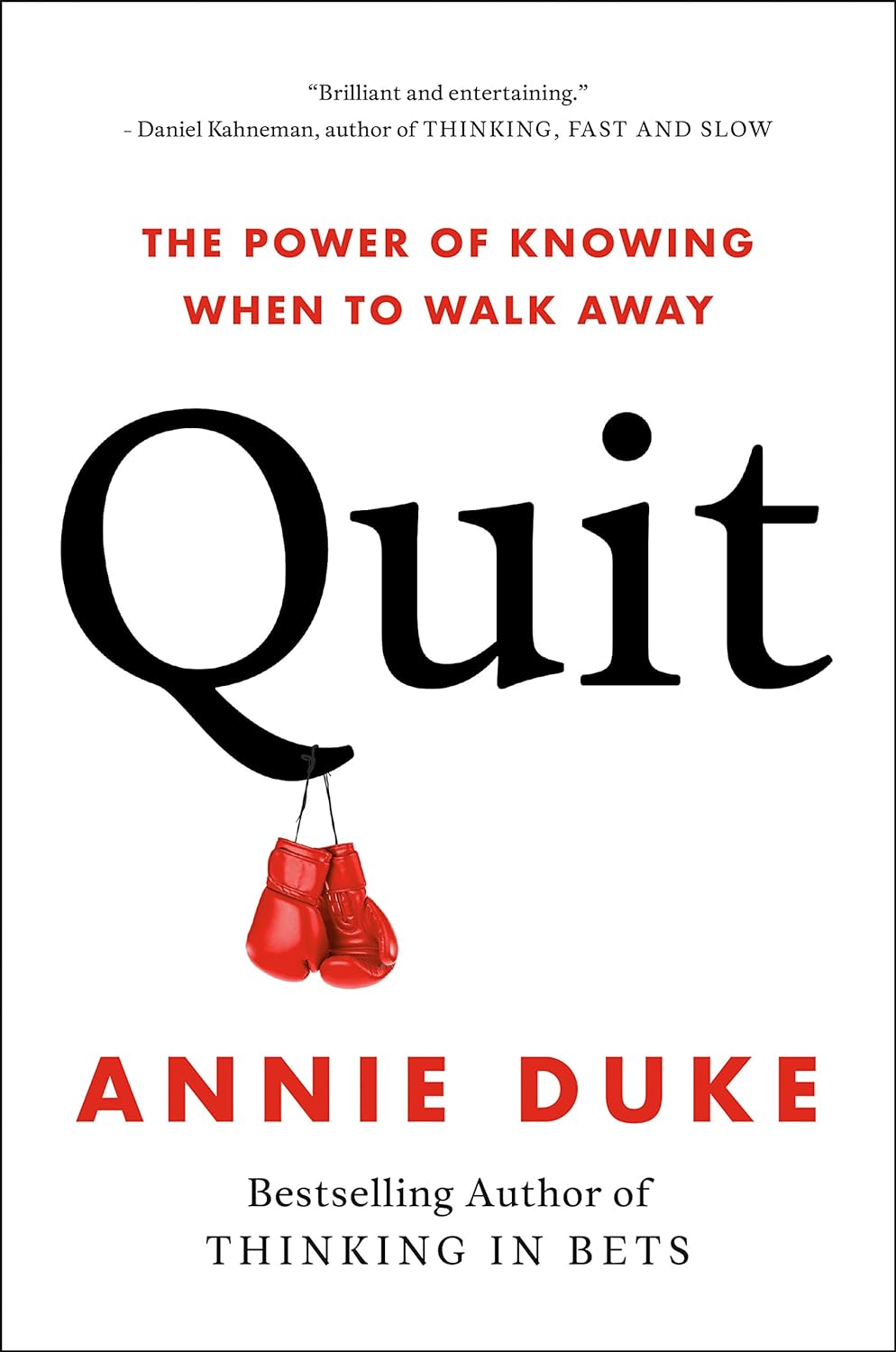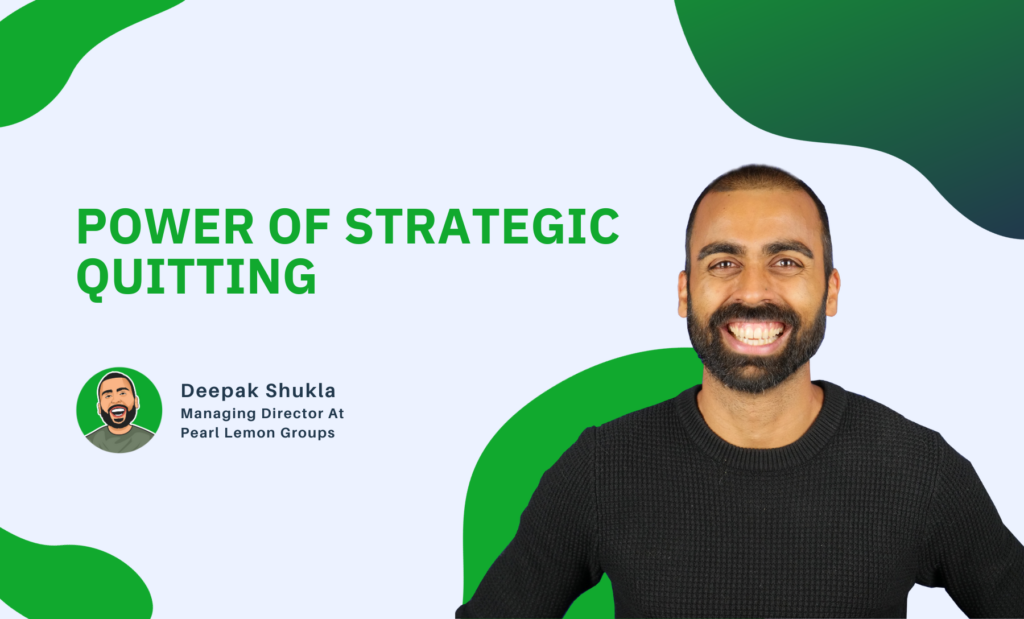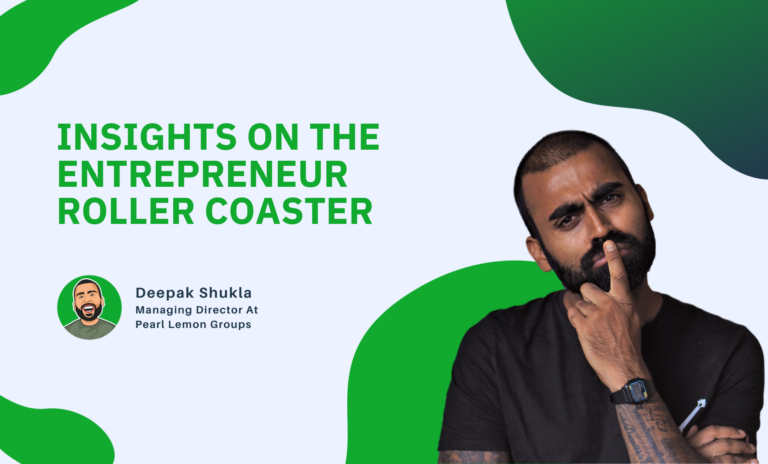Embracing the Power of Strategic Quitting: Deepak Shukla’s Reflections on Annie Duke’s “Quit: The Power of Knowing When to Walk Away”
📚 Hello, everyone, and welcome back to another session of Deepak’s daily reading! 🌟
In today’s segment, I’m thrilled to share my contemplative journey through the pages of Annie Duke’s enlightening book, “Quit: The Power of Knowing When to Walk Away”.
Having recently concluded this intriguing read, I’m buzzing with thoughts, ideas, and newfound knowledge that I am eager to share with all of you. 🤔
In the entrepreneurial universe where the buzz often revolves around perseverance, hustle, and an undying commitment to one’s goals, Duke’s book serves as a refreshing reminder and advocate for the art of ‘strategic quitting’.
As I navigated through the final chapters, I stumbled upon a concept that resonated with me and reflected on practices and philosophies I have inadvertently adhered to over the years.
“Quit: The Power of Knowing When to Walk Away” presents a compelling argument: while being goal-focused is crucial, it is equally important to acknowledge and celebrate the progress made along the journey, even if the ultimate goal evolves or no longer holds relevance.
This perspective aligns seamlessly with Dan Sullivan’s notion of “living in the game” rather than “the gap”, a concept highlighted in his book, “The Gap and The Gain”.
“Celebrate the journey, not just the destination.”
I found myself nodding in agreement with the principles laid out by Duke, recognising the echoes of my own experiences and observations within her words.
Today, I wish to dive deeper into these reflections, exploring how the concept of marking progress, appreciating achieved milestones, and understanding when to quit strategically can serve as game-changers in our professional and personal lives.
Marking Progress: A Personal Reflection 📈
Years ago, as a budding entrepreneur, I found myself trapped in a vortex of ever-changing goals.
Success, however, it was defined, always seemed one step out of reach. Duke’s idea of marking progress resonated deeply with me.
I recalled an early venture where, despite not reaching our target, our team had made remarkable progress in client acquisition.
Instead of sulking over the missed target, I chose to celebrate our achievements. This boosted team morale and laid a stronger foundation for future endeavours.
Embracing this perspective enhanced our productivity and enriched our work culture, nurturing a more holistic view of success.

Rethinking Goals: Lessons Learned 🎯
Life has a way of showing us that not all goals are set in stone.
Once, in the midst of a major project, market shifts forced us to reconsider our strategy.
The goalpost had moved.
Inspired by Duke’s teachings, I learned the art of fluid goal-setting, constantly adapting and refining based on circumstances.
“Adaptability is the true measure of strength.”
It’s a lesson I wish I’d learned earlier – sometimes, the journey and progress are more valuable than the destination itself.
The Perils Of Goal-Blindness 🛤️
On a trip to Japan, while aiming for a popular tourist spot, I got lost in a local market. Initially frustrated, I soon realised that the detour had its own charm.
I discovered local crafts, tasted authentic cuisines and interacted with wonderful locals; much like this accidental adventure, being hyper-focused on a single business goal sometimes led me to overlook potential opportunities.
Duke’s work was a reminder that sometimes the detours have their own value, and the bigger picture often contains opportunities we might not have initially seen.
Understanding And Minimising Waste ♻️
In my early entrepreneurial days, resource crunches were a regular affair.
Duke’s perspective on waste being a forward-looking problem hit home.
It’s never about the time or money already spent; it’s about the potential future waste.
There were ventures where, in hindsight, pulling out earlier would have been a wiser decision.
It’s a learning I’ve since incorporated: always look ahead and optimise to reduce wastage in every possible avenue.
In this sense, waste goes beyond tangible resources; it’s about ensuring that every ounce of effort we invest yields positive results or constructive feedback.

The Importance Of High-Leverage Tasks 🎖️
Duke’s insights into focusing on high-leverage tasks resonated with a particular project I undertook in London.
Initial efforts were scattered, leading to subpar results.
Recognising this, I streamlined our focus onto core, impactful activities. The turnaround was almost magical.
Results improved, and the project became a reference point for future endeavours.
The lesson?
Prioritise tasks that promise maximum impact.
Allocating resources and time to activities that yield the best outcomes ensures a greater return on investment and promotes sustainable growth.
Continuous Improvement And Evolution 🔄
Many see me as a seasoned entrepreneur now, but my journey has been a continuous learning curve.
A decade ago, my running regimen plateaued.
Engaging a running coach, as Duke suggests, saw my times improve.
Continuous progression, underlined by deliberate practice, is key.
It’s not just about achieving mastery but evolving to the next level of excellence.
Embracing change, seeking feedback, and committing to self-improvement are essential aspects of this evolution.

Winners Know When To Quit 🏁
There’s a saying: Winners never quit, and quitters never win.
But Duke’s book and my experiences have taught me otherwise.
Like Michael Jordan, who, despite having records, faced his share of failures, strategically knowing when to step back or change direction is crucial.
Every setback or redirection has been a stepping stone to a bigger win in my journey.
“Sometimes the best step forward is a step back.”
Conclusion 📖
Annie Duke’s “Quit: The Power of Knowing When to Walk Away” isn’t just a book; it’s a treasure trove of life and business lessons.
Understanding the power of strategic quitting is enlightening in a world that glorifies relentless pursuit.
As we wrap up today’s reflections, I invite you to embrace this new perspective, celebrate progress, and remember – it’s okay to quit, as long as it’s strategic.
Engage With Me! ✍️
I’d love to hear your thoughts on this. 🎙️
Have you ever faced a situation where strategic quitting was the best option?
Share your stories!
And if you’re keen to journey with me through more enlightening reads, make sure to comment, like, and subscribe. 📌
Until next time, keep reading, reflecting, and growing! 🚀
Key Takeaways
Strategic Quitting
- The art of ‘strategic quitting’ is a deliberate and thoughtful process, not impulsive.
- Knowing when to walk away is as important as perseverance and commitment to goals.
Marking Progress
- Celebrate small wins and progress, not just the end goal.
- Acknowledging and celebrating progress is crucial, even if the ultimate goal evolves or becomes irrelevant.
Fluid Goal-Setting
- Life and circumstances change; sometimes, goals must be re-evaluated and adjusted accordingly.
- “Adaptability is the true measure of strength.”
The Journey Matters
- The journey and progress can sometimes be more valuable than reaching the destination.
Avoid Goal-Blindness
- Being hyper-focused on a single goal can lead to missing valuable opportunities and experiences.
Minimising Waste
- Waste is not just about tangible resources but also time and effort.
- Always look ahead and optimise to reduce wastage in every possible way.
Focus on High-Leverage Tasks
- Prioritise tasks and activities that promise the maximum impact for sustainable growth.
Continuous Improvement
- Engage in continuous learning and improvement.
- Evolution to the next level of excellence is as important as achieving mastery.
Strategic Redirection
- Sometimes, stepping back or changing direction strategically is crucial for greater success.
- “Sometimes the best step forward is a step back.”
Understanding Strategic Quitting
- Strategic quitting is enlightening and empowering in a world that often only celebrates relentless pursuit and not knowing when to stop.
Engagement
- Engage with the reading community to share thoughts and experiences related to strategic quitting.
- Reflect on personal experiences where strategic quitting was beneficial, and share stories with others.
- Continue to explore and discuss enlightening reads with the community for personal and professional growth.

Book Summary
In her enlightening book “Quit: The Power of Knowing When to Walk Away”, Annie Duke explores the concept of strategic quitting as an empowering decision-making tool. Duke dismantles the stigma surrounding quitting, presenting it not as a sign of failure but as a calculated, courageous step towards realising more significant opportunities and goals. Through a blend of behavioural psychology, decision science, and personal anecdotes, Duke offers readers a roadmap for identifying when persisting is futile or detrimental. She highlights the importance of detaching self-worth from outcomes, promoting a mindset shift that values progress and learning over mere goal attainment. Duke’s work is a beacon for individuals stuck in unproductive situations, giving them the insight and confidence to quit strategically and pivot towards more fulfilling, aligned endeavours. With its blend of storytelling and empirical wisdom, Duke’s “Quit” is a crucial guide for anyone looking to navigate life’s myriad decisions with greater clarity and purpose.



